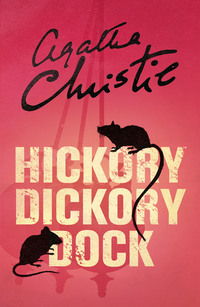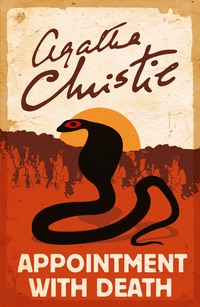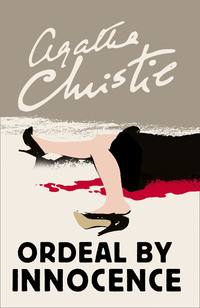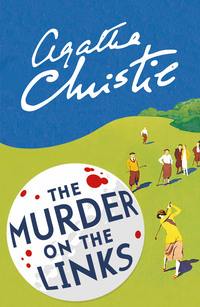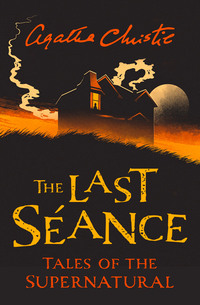
Полная версия



Copyright
Published by HarperCollinsPublishers Ltd
1 London Bridge Street
London SE1 9GF
www.harpercollins.co.uk
First published in Great Britain by Collins, The Crime Club 1945
Sparkling Cyanide™ is a trade mark of Agatha Christie Limited and Agatha Christie® and the Agatha Christie Signature are registered trade marks of Agatha Christie Limited in the UK and elsewhere.
Copyright © 1945 Agatha Christie Limited. All rights reserved.
www.agathachristie.com
Cover by juliejenkinsdesign.com © HarperCollins/Agatha Christie Ltd 2017
Agatha Christie asserts the moral right to be identified as the author of this work.
A catalogue copy of this book is available from the British Library.
This novel is entirely a work of fiction. The names, characters and incidents portrayed in it are the work of the author’s imagination. Any resemblance to actual persons, living or dead, events or localities is entirely coincidental.
All rights reserved under International and Pan-American Copyright Conventions. By payment of the required fees, you have been granted the non-exclusive, non-transferable right to access and read the text of this e-book on screen. No part of this text may be reproduced, transmitted, down-loaded, decompiled, reverse engineered, or stored in or introduced into any information storage and retrieval system, in any form or by any means, whether electronic or mechanical, now known or hereinafter invented, without the express written permission of HarperCollins.
Source ISBN: 9780008196332
Ebook Edition © February 2017 ISBN: 9780007422821
Version: 2017-04-13
Contents
Cover
Title Page
Copyright
BOOK I: Rosemary
Chapter 1: Iris Marle
Chapter 2: Ruth Lessing
Chapter 3: Anthony Browne
Chapter 4: Stephen Farraday
Chapter 5: Alexandra Farraday
Chapter 6: George Barton
BOOK II: All Souls’ Day
Chapter 1
Chapter 2
Chapter 3
Chapter 4
Chapter 5
Chapter 6
BOOK III: Iris
Chapter 1
Chapter 2
Chapter 3
Chapter 4
Chapter 5
Chapter 6
Chapter 7
Chapter 8
Chapter 9
Chapter 10
Chapter 11
Chapter 12
Chapter 13
Chapter 14
Also by Agatha Christie
About the Publisher
BOOK I
Rosemary
‘What can I do to drive away remembrance from mine eyes?’
Six people were thinking of Rosemary Barton who had died nearly a year ago …
CHAPTER 1
Iris Marle
Iris Marle was thinking about her sister, Rosemary.
For nearly a year she had deliberately tried to put the thought of Rosemary away from her. She hadn’t wanted to remember.
It was too painful—too horrible!
The blue cyanosed face, the convulsed clutching fingers …
The contrast between that and the gay lovely Rosemary of the day before … Well, perhaps not exactly gay. She had had ’flu—she had been depressed, run down … All that had been brought out at the inquest. Iris herself had laid stress on it. It accounted, didn’t it, for Rosemary’s suicide?
Once the inquest was over, Iris had deliberately tried to put the whole thing out of her mind. Of what good was remembrance? Forget it all! Forget the whole horrible business.
But now, she realized, she had got to remember. She had got to think back into the past … To remember carefully every slight unimportant seeming incident …
That extraordinary interview with George last night necessitated remembrance.
It had been so unexpected, so frightening. Wait—had it been so unexpected? Hadn’t there been indications beforehand? George’s growing absorption, his absent-mindedness, his unaccountable actions—his—well, queerness was the only word for it! All leading up to that moment last night when he had called her into the study and taken the letters from the drawer of the desk.
So now there was no help for it. She had got to think about Rosemary—to remember.
Rosemary—her sister …
With a shock Iris realized suddenly that it was the first time in her life she had ever thought about Rosemary. Thought about her, that is, objectively, as a person.
She had always accepted Rosemary without thinking about her. You didn’t think about your mother or your father or your sister or your aunt. They just existed, unquestioned, in those relationships.
You didn’t think about them as people. You didn’t ask yourself, even, what they were like.
What had Rosemary been like?
That might be very important now. A lot might depend upon it. Iris cast her mind back into the past. Herself and Rosemary as children …
Rosemary had been the elder by six years.
Glimpses of the past came back—brief flashes—short scenes. Herself as a small child eating bread and milk, and Rosemary, important in pig tails, ‘doing lessons’ at a table.
The seaside one summer—Iris envying Rosemary who was a ‘big girl’ and could swim!
Rosemary going to boarding school—coming home for the holidays. Then she herself at school, and Rosemary being ‘finished’ in Paris. Schoolgirl Rosemary; clumsy, all arms and legs. ‘Finished’ Rosemary coming back from Paris with a strange new frightening elegance, soft voiced, graceful, with a swaying undulating figure, with red gold chestnut hair and big black fringed dark blue eyes. A disturbing beautiful creature—grown up—in a different world!
From then on they had seen very little of each other, the six-year gap had been at its widest.
Iris had been still at school, Rosemary in the full swing of a ‘season.’ Even when Iris came home, the gap remained. Rosemary’s life was one of late mornings in bed, fork luncheons with other débutantes, dances most evenings of the week. Iris had been in the schoolroom with Mademoiselle, had gone for walks in the park, had had supper at nine o’clock and gone to bed at ten. The intercourse between the sisters had been limited to such brief interchanges as:
‘Hullo, Iris, telephone for a taxi for me, there’s a lamb, I’m going to be devastatingly late,’ or
‘I don’t like that new frock, Rosemary. It doesn’t suit you. It’s all bunch and fuss.’
Then had come Rosemary’s engagement to George Barton. Excitement, shopping, streams of parcels, bridesmaids’ dresses.
The wedding. Walking up the aisle behind Rosemary, hearing whispers:
‘What a beautiful bride she makes …’
Why had Rosemary married George? Even at the time Iris had been vaguely surprised. There had been so many exciting young men, ringing Rosemary up, taking her out. Why choose George Barton, fifteen years older than herself, kindly, pleasant, but definitely dull?
George was well off, but it wasn’t money. Rosemary had her own money, a great deal of it.
Uncle Paul’s money …
Iris searched her mind carefully, seeking to differentiate between what she knew now and what she had known then: Uncle Paul, for instance?
He wasn’t really an uncle, she had always known that. Without ever having been definitely told them she knew certain facts. Paul Bennett had been in love with their mother. She had preferred another and a poorer man. Paul Bennett had taken his defeat in a romantic spirit. He had remained the family friend, adopted an attitude of romantic platonic devotion. He had become Uncle Paul, had stood godfather to the first-born child, Rosemary. When he died, it was found that he had left his entire fortune to his little god-daughter, then a child of thirteen.
Rosemary, besides her beauty, had been an heiress. And she had married nice dull George Barton.
Why? Iris had wondered then. She wondered now. Iris didn’t believe that Rosemary had ever been in love with him. But she had seemed very happy with him and she had been fond of him—yes, definitely fond of him. Iris had good opportunities for knowing, for a year after the marriage, their mother, lovely delicate Viola Marle, had died, and Iris, a girl of seventeen, had gone to live with Rosemary Barton and her husband.
A girl of seventeen. Iris pondered over the picture of herself. What had she been like? What had she felt, thought, seen?
She came to the conclusion that that young Iris Marle had been slow of development—unthinking, acquiescing in things as they were. Had she resented, for instance, her mother’s earlier absorption in Rosemary? On the whole she thought not. She had accepted, unhesitatingly, the fact that Rosemary was the important one. Rosemary was ‘out’—naturally her mother was occupied as far as her health permitted with her elder daughter. That had been natural enough. Her own turn would come some day. Viola Marle had always been a somewhat remote mother, preoccupied mainly with her own health, relegating her children to nurses, governesses, schools, but invariably charming to them in those brief moments when she came across them. Hector Marle had died when Iris was five years old. The knowledge that he drank more than was good for him had permeated so subtly that she had not the least idea how it had actually come to her.
Seventeen-year-old Iris Marle had accepted life as it came, had duly mourned for her mother, had worn black clothes, had gone to live with her sister and her sister’s husband at their house in Elvaston Square.
Sometimes it had been rather dull in that house. Iris wasn’t to come out, officially, until the following year. In the meantime she took French and German lessons three times a week, and also attended domestic science classes. There were times when she had nothing much to do and nobody to talk to. George was kind, invariably affectionate and brotherly. His attitude had never varied. He was the same now.
And Rosemary? Iris had seen very little of Rosemary. Rosemary had been out a good deal. Dressmakers, cocktail parties, bridge …
What did she really know about Rosemary when she came to think of it? Of her tastes, of her hopes, of her fears? Frightening, really, how little you might know of a person after living in the same house with them! There had been little or no intimacy between the sisters.
But she’d got to think now. She’d got to remember. It might be important.
Certainly Rosemary had seemed happy enough …
Until that day—a week before it happened.
She, Iris, would never forget that day. It stood out crystal clear—each detail, each word. The shining mahogany table, the pushed back chair, the hurried characteristic writing …
Iris closed her eyes and let the scene come back …
Her own entry into Rosemary’s sitting-room, her sudden stop.
It had startled her so; what she saw! Rosemary, sitting at the writing table, her head laid down on her outstretched arms. Rosemary weeping with a deep abandoned sobbing. She’d never seen Rosemary cry before—and this bitter, violent weeping frightened her.
True, Rosemary had had a bad go of ’flu. She’d only been up a day or two. And everyone knew that ’flu did leave you depressed. Still—
Iris had cried out, her voice childish, startled:
‘Oh, Rosemary, what is it?’
Rosemary sat up, swept the hair back from her disfigured face. She struggled to regain command of herself. She said quickly:
‘It’s nothing—nothing—don’t stare at me like that!’
She got up and passing her sister, she ran out of the room.
Puzzled, upset, Iris went farther into the room. Her eyes, drawn wonderingly to the writing table, caught sight of her own name in her sister’s handwriting. Had Rosemary been writing to her then?
She drew nearer, looked down on the sheet of blue notepaper with the big characteristic sprawling writing, even more sprawling than usual owing to the haste and agitation behind the hand that held the pen.
Darling Iris,
There isn’t any point in my making a will because my money goes to you anyway, but I’d like certain of my things to be given to certain people.
To George, the jewellery he’s given me, and the little enamel casket we bought together when we were engaged.
To Gloria King, my platinum cigarette case.
To Maisie, my Chinese Pottery horse that she’s always admir—
It stopped there, with a frantic scrawl of the pen as Rosemary had dashed it down and given way to uncontrollable weeping.
Iris stood as though turned to stone.
What did it mean? Rosemary wasn’t going to die, was she? She’d been very ill with influenza, but she was all right now. And anyway people didn’t die of ’flu—at least sometimes they did, but Rosemary hadn’t. She was quite well now, only weak and run down.
Iris’s eyes went over the words again and this time a phrase stood out with startling effect:
‘… my money goes to you anyway …’
It was the first intimation she had had of the terms of Paul Bennett’s will. She had known since she was a child that Rosemary had inherited Uncle Paul’s money, that Rosemary was rich whilst she herself was comparatively poor. But until this moment she had never questioned what would happen to that money on Rosemary’s death.
If she had been asked, she would have replied that she supposed it would go to George as Rosemary’s husband, but would have added that it seemed absurd to think of Rosemary dying before George!
But here it was, set down in black and white, in Rosemary’s own hand. At Rosemary’s death the money came to her, Iris. But surely that wasn’t legal? A husband or wife got any money, not a sister. Unless, of course, Paul Bennett had left it that way in his will. Yes, that must be it. Uncle Paul had said the money was to go to her if Rosemary died. That did make it rather less unfair—
Unfair? She was startled as the word leapt to her thoughts. Had she then been thinking that it was unfair for Rosemary to get all Uncle Paul’s money? She supposed that, deep down, she must have been feeling just that. It was unfair. They were sisters, she and Rosemary. They were both her mother’s children. Why should Uncle Paul give it all to Rosemary?
Rosemary always had everything!
Parties and frocks and young men in love with her and an adoring husband.
The only unpleasant thing that ever happened to Rosemary was having an attack of ’flu! And even that hadn’t lasted longer than a week!
Iris hesitated, standing by the desk. That sheet of paper—would Rosemary want it left about for the servants to see?
After a minute’s hesitation she picked it up, folded it in two and slipped it into one of the drawers of the desk.
It was found there after the fatal birthday party, and provided an additional proof, if proof was necessary, that Rosemary had been in a depressed and unhappy state of mind after her illness, and had possibly been thinking of suicide even then.
Depression after influenza. That was the motive brought forward at the inquest, the motive that Iris’s evidence helped to establish. An inadequate motive, perhaps, but the only one available, and consequently accepted. It had been a bad type of influenza that year.
Neither Iris nor George Barton could have suggested any other motive—then.
Now, thinking back over the incident in the attic, Iris wondered that she could have been so blind.
The whole thing must have been going on under her eyes! And she had seen nothing, noticed nothing!
Her mind took a quick leap over the tragedy of the birthday party. No need to think of that! That was over—done with. Put away the horror of that and the inquest and George’s twitching face and bloodshot eyes. Go straight on to the incident of the trunk in the attic.
That had been about six months after Rosemary’s death.
Iris had continued to live at the house in Elvaston Square. After the funeral the Marle family solicitor, a courtly old gentleman with a shining bald head and unexpectedly shrewd eyes, had had an interview with Iris. He had explained with admirable clarity that under the will of Paul Bennett, Rosemary had inherited his estate in trust to pass at her death to any children she might have. If Rosemary died childless, the estate was to go to Iris absolutely. It was, the solicitor explained, a very large fortune which would belong to her absolutely upon attaining the age of twenty-one or on her marriage.
In the meantime, the first thing to settle was her place of residence. Mr George Barton had shown himself anxious for her to continue living with him and had suggested that her father’s sister, Mrs Drake, who was in impoverished circumstances owing to the financial claims of a son (the black sheep of the Marle family), should make her home with them and chaperon Iris in society. Did Iris approve of this plan?
Iris had been quite willing, thankful not to have to make new plans. Aunt Lucilla she remembered as an amiable friendly sheep with little will of her own.
So the matter had been settled. George Barton had been touchingly pleased to have his wife’s sister still with him and treated her affectionately as a younger sister. Mrs Drake, if not a stimulating companion, was completely subservient to Iris’s wishes. The household settled down amicably.
It was nearly six months later that Iris made her discovery in the attic.
The attics of the Elvaston Square house were used as storage rooms for odds and ends of furniture, and a number of trunks and suitcases.
Iris had gone up there one day after an unsuccessful hunt for an old red pullover for which she had an affection. George had begged her not to wear mourning for Rosemary, Rosemary had always been opposed to the idea, he said. This, Iris knew, was true, so she acquiesced and continued to wear ordinary clothes, somewhat to the disapproval of Lucilla Drake, who was old-fashioned and liked what she called ‘the decencies’ to be observed. Mrs Drake herself was still inclined to wear crêpe for a husband deceased some twenty-odd years ago!
Various unwanted clothes, Iris knew, had been packed away in a trunk upstairs. She started hunting through it for her pullover, coming across, as she did so, various forgotten belongings, a grey coat and skirt, a pile of stockings, her skiing kit and one or two old bathing dresses.
It was then that she came across an old dressing-gown that had belonged to Rosemary and which had somehow or other escaped being given away with the rest of Rosemary’s things. It was a mannish affair of spotted silk with big pockets.
Iris shook it out, noting that it was in perfectly good condition. Then she folded it carefully and returned it to the trunk. As she did so, her hand felt something crackle in one of the pockets. She thrust in her hand and drew out a crumpled-up piece of paper. It was in Rosemary’s handwriting and she smoothed it out and read it.
Leopard darling, you can’t mean it … You can’t—you can’t … We love each other! We belong together! You must know that just as I know it! We can’t just say goodbye and go on coolly with our own lives. You know that’s impossible, darling—quite impossible. You and I belong together—for ever and ever. I’m not a conventional woman—I don’t mind about what people say. Love matters more to me than anything else. We’ll go away together—and be happy—I’ll make you happy. You said to me once that life without me was dust and ashes to you—do you remember, Leopard darling? And now you write calmly that all this had better end—that it’s only fair to me. Fair to me? But I can’t live without you! I’m sorry about George—he’s always been sweet to me—but he’ll understand. He’ll want to give me my freedom. It isn’t right to live together if you don’t love each other any more. God meant us for each other, darling—I know He did. We’re going to be wonderfully happy—but we must be brave. I shall tell George myself—I want to be quite straight about the whole thing—but not until after my birthday.
I know I’m doing what’s right, Leopard darling—and I can’t live without you—can’t, can’t—CAN’T. How stupid it is of me to write all this. Two lines would have done. Just ‘I love you. I’m never going to let you go.’ Oh darling—
The letter broke off.
Iris stood motionless, staring down at it.
How little one knew of one’s own sister!
So Rosemary had had a lover—had written him passionate love letters—had planned to go away with him?
What had happened? Rosemary had never sent the letter after all. What letter had she sent? What had been finally decided between Rosemary and this unknown man?
(‘Leopard!’ What extraordinary fancies people had when they were in love. So silly. Leopard indeed!)
Who was this man? Did he love Rosemary as much as she loved him? Surely he must have done. Rosemary was so unbelievably lovely. And yet, according to Rosemary’s letter, he had suggested ‘ending it all’. That suggested—what? Caution? He had evidently said that the break was for Rosemary’s sake. That it was only fair to her. Yes, but didn’t men say that sort of thing to save their faces? Didn’t it really mean that the man, whoever he was, was tired of it all? Perhaps it had been to him a mere passing distraction. Perhaps he had never really cared. Somehow Iris got the impression that the unknown man had been very determined to break with Rosemary finally …
But Rosemary had thought differently. Rosemary wasn’t going to count the cost. Rosemary had been determined, too …
Iris shivered.
And she, Iris, hadn’t known a thing about it! Hadn’t even guessed! Had taken it for granted that Rosemary was happy and contented and that she and George were quite satisfied with one another. Blind! She must have been blind not to know a thing like that about her own sister.
But who was the man?
She cast her mind back, thinking, remembering. There had been so many men about, admiring Rosemary, taking her out, ringing her up. There had been no one special. But there must have been—the rest of the bunch were mere camouflage for the one, the only one, that mattered. Iris frowned perplexedly, sorting her remembrances carefully.
Two names stood out. It must, yes, positively it must, be one or the other. Stephen Farraday? It must be Stephen Farraday. What could Rosemary have seen in him? A stiff pompous young man—and not so very young either. Of course people did say he was brilliant. A rising politician, an under-secretaryship prophesied in the near future, and all the weight of the influential Kidderminster connection behind him. A possible future Prime Minister! Was that what had given him glamour in Rosemary’s eyes? Surely she couldn’t care so desperately for the man himself—such a cold self-contained creature? But they said that his own wife was passionately in love with him, that she had gone against all the wishes of her powerful family in marrying him—a mere nobody with political ambitions! If one woman felt like that about him, another woman might also. Yes, it must be Stephen Farraday.


